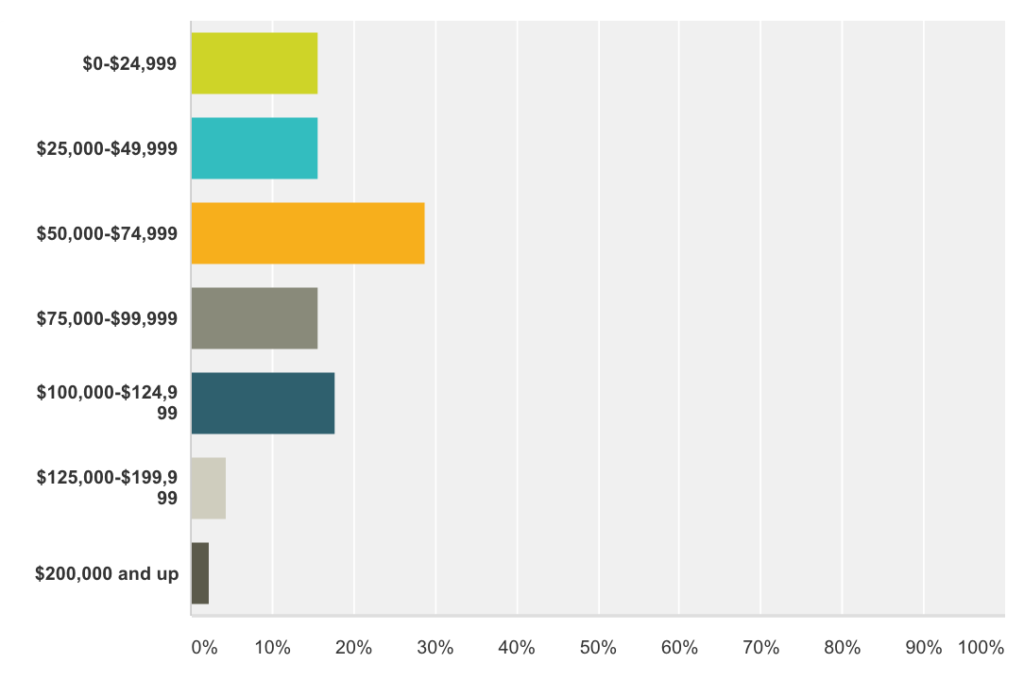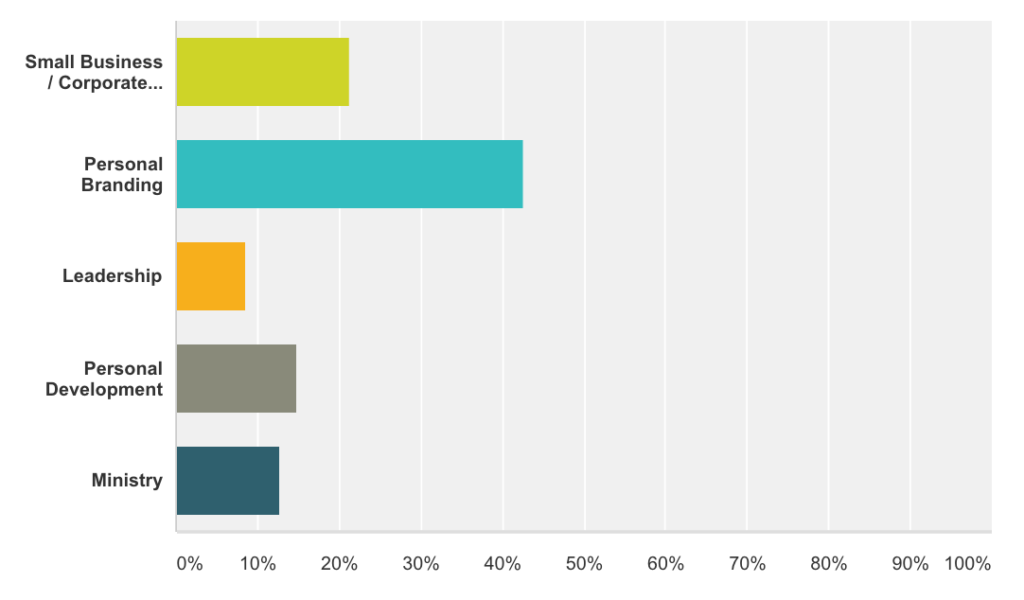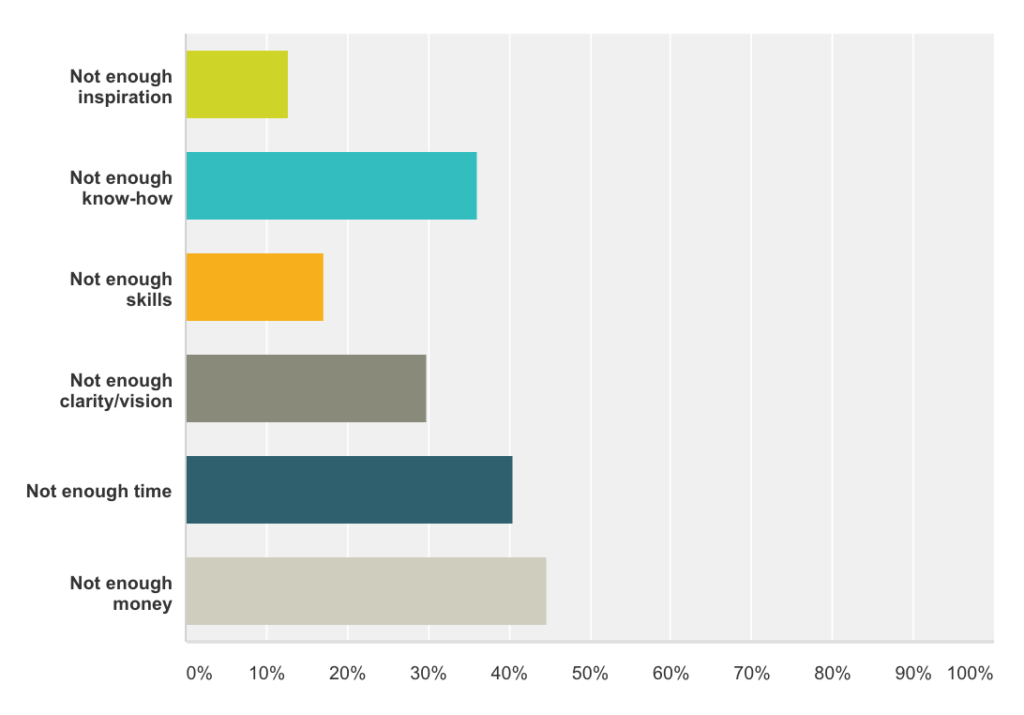 Well, the results are in. Several weeks ago I sent out a reader survey for the past year. While the actual number of responses were lower than past years (165 people responded, as of this writing), I feel it’s more accurate since I only asked the people on my email list to participate.
Well, the results are in. Several weeks ago I sent out a reader survey for the past year. While the actual number of responses were lower than past years (165 people responded, as of this writing), I feel it’s more accurate since I only asked the people on my email list to participate.
How you can use this report for your own brand:
As you read this, consider how I analyze the data (not just see what the data says). To successfully market your business, you must learn to do three things:
- Collect data
- Analyze data with critical thinking
- Implement a strategic response to your findings
I did this regularly in my marketing job when I was working full-time as a company’s chief marketing officer. This blog post is a perfect example of how to walk through this process yourself.
You must learn to do what I’m about to show you — especially if you are in the personal brand space. Why? You don’t have the luxury of dumping thousands of dollars into ineffective marketing. I highly suggest you read every single word of this post.
Disclaimer: I am going to speak in completely stereotypical terms because honestly, that’s how marketers talk behind closed doors. (Please give me some grace if I end up sounding overly straightforward.)
Let’s rock.
Demographic Data:
- 61% are male, 39% are female
- 25% are 35-44 years old (the second highest, 23% are 45-55)
- 33% are in the “personal brand” space (the runner-up: 19% in Christian ministry)
The other categories: business professionals, small business owner, non-profit, creative / arts, and education.
Demographic analysis and reaction:
The male / female ratio does not surprise me, though I’m a bit surprised at how much of my readers are female. Just a year ago, the ratio was about 70 / 30.
The age range is a bit of a surprise. I, the author of this blog, sit at the younger end of the vast majority of my readership (I was 36 years old when this survey was sent to my list).
My first thought: awesome! I have always wanted to write content that speaks to a cross-generational audience. This has always been a personal strength of mine. People older than me have always seemed to like me. In fact, I wrote a post about how to lead people older than you, and it is still one of my most popular articles.
Hypothesis #1 – Older readers may view me as being up-to-date on things typically associated with younger people such as technology, online marketing, or social media … but don’t think I’m a young, arrogant, snot-nosed punk! Coupled with my tenure as the Chief Marketing Officer of a seven-figure brand, they probably assume I know what I’m doing. So in both age and profession, I may well be a good balance for them.
Hypothesis #2 – My content is practical. I show them how to actually overcome technological barriers (they may not know how), or market / sell (they may not have a background in those things) without doing what kids do: make anyone older people feel out-of-touch or over-the-hill. (Ever see what happens when a parent asks their teen how to use the computer? It’s not pretty.)
As for my readers’ occupation …
I’m very happy that 33% have said they are building a personal brand. This was not the case two years ago — not even close! That means I have attracted the right readers through a focused and sustained content marketing strategy:
- Podcast is called “Brand You”
- Phrase “personal brand” is all over my site
- Slogan, “Live Your Message, Love Your Work, Leave Your Mark On The World” reflects personal branding
- Blog post headlines over the past 18 months are primarily about marketing a personal brand
Success!
19% are in Christian ministry (many of my readers carried over from my former “career”), but notice how few are business professionals or small business owners. While I wish I had more business professionals and small business owners as readers, my take is this:
- My content isn’t speaking to their needs
- Those folks don’t read a lot of blogs — they’re too busy!
Did you know I rebranded my podcast in 2014? When I started my podcast, I targeted small business owners. With my work as CMO, I knew I could help these folks. When the show went nowhere, a light went off in my head — small businesses owners seldom listen to podcasts. The dude that runs a pizza shop — he’s not tuning into Mike Kim’s podcast, even if he needs it!
I switched my focus solely on the personal brand builder, and the show has skyrocketed. Yay, marketing survey of 2014!
As for my reader’s income …
I intentionally asked for this data (everything is anonymous, of course), and there are very important reasons why. Take a look at this chart:

Analysis: My first reaction is, “My goal should be to help the largest demographic move up to the next one.” I need to provide content that helps people move from the $50,000-$74,999 bracket up to the near six-figure bracket.
The interesting thing: I know how much I charge for consulting work, and most of these folks are from the six-figure bracket. It doesn’t surprise me that is the second highest income range. It also doesn’t hurt that I helped a company 6x their profits in 3 years from a “C-suite” position. This resonates with this group.
My strategy should be to share a good mix of foundational content for people looking to start a business, coupled with deeper strategies for people that are already established.
“Your survey is too long, you should get rid of the demographic questions and income.”
That’s what one responder said (I have no idea who). As a marketer, the information I’ve shared up to this point is the most powerful information I could ever want.
I’m sure the person meant well, but it’s a completely ill-founded comment when it comes to marketing. (It’s not like this person had to answer, all the questions were optional.)

Attention: If you don’t think companies are trying their hardest to gather this kind of data about you, you are in denial. Every time you swipe your credit card at say, Target, they record those transactions permanently — the items you buy, how much your average spending is per visit, and how often you come in the store.
This information is then kicked back to their uber-powerful marketing team, who sends you (forgive the pun) targeted deals, coupons, and campaigns because they have read you to a tee.
Ever feel like, “Dang, it’s like Target knows me! They sent me more coupons on diapers!”
They do.
They know your zip code (read: your property value and income level), can generalize your age based on what you buy, and whether you have kids or not (20 year old college kids aren’t buying diapers … at least regularly).
If enough “Kims” buy diapers at Target, their marketing people will think, “Hmm, we’re pretty sure Kim isn’t an Irish name. Time to put more Asian babies on our flyers! Get cute Asian babies on the next campaign, stat!”
(Apparently this is not the case, because I couldn’t find a single picture of an Asian on Target’s marketing. Asians don’t really shop there, honestly. When I visited Louis Vuitton in Paris last year, the Asians were like 70% of the customers in the store. No joke. Alas, I digress.)
If you’re building a brand, you need this information.
You don’t have to get creepy like Target, but you need this demographic information for your business. If you have in-person clients, your job is easier than mine. Me? I post something on a blog and have no idea who reads it. I don’t see a face.
Demographic information helps me “paint” one, and helps me serve that person the best I can. My goal is to serve the people that find me helpful. To do that, I must know who I’m serving.
The religion thing …
Nearly 100% of participants identified themselves as “Christian,” with 91% of them saying faith is very important to their lives. Why did I ask this?
First, it’s because I have a “carry over” audience from what I used to write about: Christian ministry. Secondly, it let’s me know the voice and flavor of the content my audience prefers. (Looks like Chris Rock won’t be doing a guest post for me anytime soon, not that he would anyways.)
52% said they were comfortable with how much I talk about faith on my blog, 48% said they wished I said more. I figure to ratchet it up a click, but still tie faith into personal brand building content because that is what people say they enjoy most:

What is my audience struggling with?
Limiting beliefs are powerful, but sometimes it’s not a limiting belief, it’s a limiting fact. I asked you what your biggest struggle was. Here’s the breakdown:

Analysis: Not having enough money is the biggest challenge (reflected in the income demographic earlier). So, I should talk more about how to earn more money, or how to be more resourceful with what you already have.
I should also create content that saves time. Perhaps I should create more copywriting templates or how-to videos that expedite the writing or marketing process. You can see that the need is shaping the kind of content I plan to create.
Issues like clarity, vision, and skills … I can’t do much about those things unless I work with people directly through coaching or training. Coaching and training are strengths of mine, so I at least know I can serve these particular people. It will just be a more labor intensive investment on my part, and I’ve yet to offer any kind of flagship program or product because I don’t have the bandwidth right now.
If you hate marketing, please know …
I commend you for making this far. It means you’re hungry to learn more about marketing (even if you may not share my passion for it).
Many people view marketing as a necessary evil. I have a different mentality: marketing is simply letting people know there is a solution for their struggle.
You’ll notice that in this post, I haven’t said anything like, “Muhahaha, a ton of people make over $100,000 on my list … I’m gonna milk these suckers and buy a yacht!”
Are there marketers like that? Of course. They ruin it for the rest of us.
But here’s what else ruins marketing: fear. More specifically, your fear.
You’re afraid of sounding like a used-car salesman, or a pushy musclehead pressuring you to sign up for a gym membership during a free trial. You’re afraid of being called a telemarketer, or worse: a spammer.
Your fear of your own reputation is actually the root of your aversion to marketing. Unfortunately, allowing that root to fester will sabatoge the very help you can provide to others. (It also sabotages your ability to make a living doing what you love.)
The world needs your business; it also needs mine. That’s not an arrogant thing to say, it’s a fact. So, wherever you’re reading this, say this three times out loud: “The world needs my business!” Say it everyday if you need to. The sooner you truly realize that, the more you’ll be able to market effectively and serve others.
I am thankful for you, and hope to hear from you one way or another soon.
There are tons of blogs and podcasts out there. I’m so thankful to be part of your journey, and deeply appreciate you being part of mine. I can honestly say — the most important and treasured possession I have (outside of my loved ones of course) is this blog. Strange, but true. My life has been enriched and taken deeper meaning because of connecting with you here.
I look forward to serving you in the days to come, to the very best of my ability.
Do you have a question? A pressing need? Leave a comment below or leave a question for my podcast and I’ll create content to that need.
Liked this post? Check out: